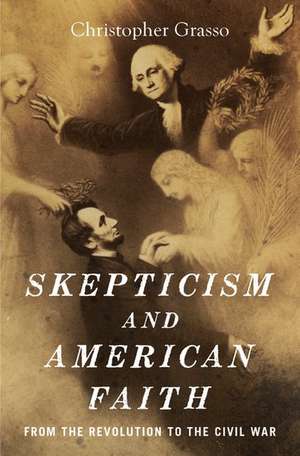Skepticism and American Faith: from the Revolution to the Civil War
Autor Christopher Grassoen Limba Engleză Hardback – 19 iul 2018
Preț: 239.24 lei
Preț vechi: 261.02 lei
-8% Nou
Puncte Express: 359
Preț estimativ în valută:
45.78€ • 47.74$ • 38.05£
45.78€ • 47.74$ • 38.05£
Carte tipărită la comandă
Livrare economică 10-15 martie
Preluare comenzi: 021 569.72.76
Specificații
ISBN-13: 9780190494377
ISBN-10: 0190494379
Pagini: 664
Ilustrații: 40 hts
Dimensiuni: 239 x 160 x 41 mm
Greutate: 1.04 kg
Editura: Oxford University Press
Colecția OUP USA
Locul publicării:New York, United States
ISBN-10: 0190494379
Pagini: 664
Ilustrații: 40 hts
Dimensiuni: 239 x 160 x 41 mm
Greutate: 1.04 kg
Editura: Oxford University Press
Colecția OUP USA
Locul publicării:New York, United States
Recenzii
An astonishing work of scholarship exploring the relationship between skepticism and faith from the late eighteenth century to the years just after the Civil War....Through a number of intellectual portraits, readers are guided from the deism of the 1780s through the growing attempts to stifle free thought and inquiry in a republic seized with all sorts of reformist fervor and rapidly evolving political and social institutions in the early to mid-nineteenth century.... All of the individuals discussed have complicated spiritual journeys that are carefully delineated....We are shown the little-discussed but important rise of skepticism among the enslaved population....Grasso moves deftly over the persistence of honest dissent, always fully sensitive to the complexity of skepticism.
Skepticism and Faith establishes an impressive new framework for reconsidering many of the era's most pressing social, political, and economic concerns. It admirably revises and supersedes Henry May's taxonomic The Enlightenment in America (Oxford UP, 1975)...and provides essential historical grounding for emerging debates in secularization theory.
Erudite and meticulously researched....By focusing on people's lived experiences, Grasso convincingly shows that skepticism was not just an attitude embraced by an intellectual elite but was a perspective that appealed to a broad spectrum of antebellum society, including women, free blacks, and enslaved peoples. He takes the perspectives of his historical subjects seriously, reconstructing their ideas, practices, and experiences.
Learned and imaginative. Christopher Grasso challenges the conventional wisdom about belief and unbelief in the United States in the early American republic..Skepticism and American Faithsucceeds not only as an intellectual history but also as a work of lived religionand lived irreligionthrough its vivid sketches of seekers across the spiritual spectrum.
Grasso unearthed a treasure trove of material from mostly obscure personages who entered the fray with a fury shortly after the American Revolution ... the story is well worth telling, and Grasso does a marvelous job in laying it out for curious readers.
Monumental... Skepticism and American Faith is one of the most inventive studies of the religious environment of America between the revolution and the Civil War in some time.
In Skepticism and American Faith: From the Revolution to the Civil War, historian Christopher Grasso contends that a persistent dialogue between skepticism and Christianity indelibly shaped the antebellum United States. With an eye for colorful characters-mechanics, preachers, housewives, reformers, slaveholders, soldiers, and many more-Grasso makes his case in admirable if sometimes excruciating detail. Readers will learn of Methodist preachers whose private doubts mushroomed into publicly scandalous unbelief, of self-proclaimed infidels lurching into Christian faith, of competing churches that painted each other as engines of infidelity, of pro-slavery clergymen who linked infidelity and abolitionism to form the dominant (white) Christianity of the South, and of abolitionist preachers who shaped US nationalism by warning against the national sins of slavery and unbelief.
Skepticism and Faith establishes an impressive new framework for reconsidering many of the era's most pressing social, political, and economic concerns. It admirably revises and supersedes Henry May's taxonomic The Enlightenment in America (Oxford UP, 1975)...and provides essential historical grounding for emerging debates in secularization theory.
Erudite and meticulously researched....By focusing on people's lived experiences, Grasso convincingly shows that skepticism was not just an attitude embraced by an intellectual elite but was a perspective that appealed to a broad spectrum of antebellum society, including women, free blacks, and enslaved peoples. He takes the perspectives of his historical subjects seriously, reconstructing their ideas, practices, and experiences.
Learned and imaginative. Christopher Grasso challenges the conventional wisdom about belief and unbelief in the United States in the early American republic..Skepticism and American Faithsucceeds not only as an intellectual history but also as a work of lived religionand lived irreligionthrough its vivid sketches of seekers across the spiritual spectrum.
Grasso unearthed a treasure trove of material from mostly obscure personages who entered the fray with a fury shortly after the American Revolution ... the story is well worth telling, and Grasso does a marvelous job in laying it out for curious readers.
Monumental... Skepticism and American Faith is one of the most inventive studies of the religious environment of America between the revolution and the Civil War in some time.
In Skepticism and American Faith: From the Revolution to the Civil War, historian Christopher Grasso contends that a persistent dialogue between skepticism and Christianity indelibly shaped the antebellum United States. With an eye for colorful characters-mechanics, preachers, housewives, reformers, slaveholders, soldiers, and many more-Grasso makes his case in admirable if sometimes excruciating detail. Readers will learn of Methodist preachers whose private doubts mushroomed into publicly scandalous unbelief, of self-proclaimed infidels lurching into Christian faith, of competing churches that painted each other as engines of infidelity, of pro-slavery clergymen who linked infidelity and abolitionism to form the dominant (white) Christianity of the South, and of abolitionist preachers who shaped US nationalism by warning against the national sins of slavery and unbelief.
Notă biografică
Christopher Grasso is professor of history at the College of William and Mary. He is the former editor of the William and Mary Quarterly and the author of A Speaking Aristocracy: Transforming Public Discourse in Eighteenth-Century Connecticut.
